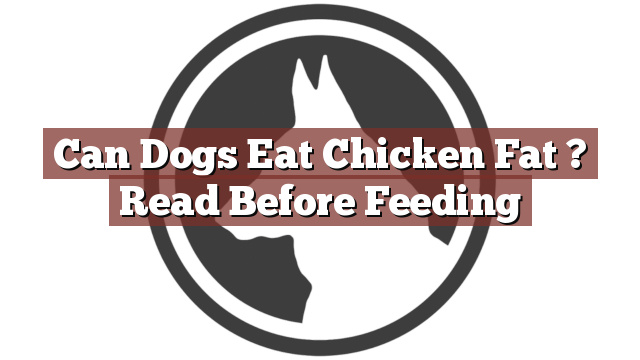Understanding Your Dog’s Dietary Needs
As a responsible dog owner, it is crucial to understand your furry friend’s dietary needs. Dogs require a balanced diet that includes proteins, fats, carbohydrates, vitamins, and minerals to maintain their overall health and well-being. While it’s tempting to share our food with our pets, it’s essential to ensure that what we feed them is safe and suitable for their digestion.
Can Dogs Eat Chicken Fat? Read Before Feeding
Can dogs eat chicken fat? The answer is yes. Chicken fat can be a valuable addition to your dog’s diet when given in moderation. It is a good source of omega-6 fatty acids, which are essential for your dog’s skin and coat health. Additionally, chicken fat is highly palatable and can enhance the flavor of your dog’s food, making it more appetizing.
However, it is crucial to note that while chicken fat is generally safe for dogs, it should be given in limited quantities. Too much fat in your dog’s diet can lead to weight gain and digestive issues. It is recommended to consult with your veterinarian to determine the appropriate amount of chicken fat to include in your dog’s diet based on their breed, size, age, and overall health.
Pros and Cons of Feeding Chicken Fat to Your Dog
Feeding chicken fat to your dog comes with both pros and cons that should be considered before incorporating it into their diet.
Pros:
-
Improved Skin and Coat Health: Chicken fat is rich in omega-6 fatty acids, which promote healthy skin and a shiny coat for your dog.
-
Enhanced Flavor: Adding chicken fat to your dog’s food can make it more appealing, especially for picky eaters.
-
Source of Energy: Fats are a concentrated source of energy, and chicken fat can provide your dog with the necessary fuel to stay active and playful.
Cons:
-
Weight Gain: Excessive consumption of chicken fat can lead to weight gain in dogs, which can have negative implications for their overall health.
-
Digestive Issues: Some dogs may have trouble digesting high-fat foods, resulting in diarrhea or upset stomach. It is important to monitor your dog’s digestion when introducing chicken fat into their diet.
Conclusion: Considerations for Feeding Chicken Fat to Your Dog
In conclusion, dogs can eat chicken fat, but in moderation. While it offers benefits such as improved skin and coat health and enhanced flavor, it should be given in limited quantities to avoid weight gain and digestive issues. As with any dietary change, it is best to consult with your veterinarian before adding chicken fat to your dog’s meals. They can provide personalized advice based on your dog’s specific needs, ensuring a balanced and nutritious diet for your beloved furry companion.
Thank you for taking the time to read through our exploration of [page_title]. As every dog lover knows, our furry friends have unique dietary needs and responses, often varying from one canine to another. This is why it's paramount to approach any changes in their diet with caution and knowledge.
Before introducing any new treats or making alterations to your dog's diet based on our insights, it's crucial to consult with a veterinarian about [page_title]. Their expertise ensures that the choices you make are well-suited to your particular pet's health and well-being.
Even seemingly harmless foods can sometimes lead to allergic reactions or digestive issues, which is why monitoring your dog after introducing any new food item is essential.
The content provided here on [page_title] is crafted with care, thorough research, and a genuine love for dogs. Nevertheless, it serves as a general guideline and should not be considered a substitute for professional veterinary advice.
Always prioritize the expert insights of your veterinarian, and remember that the health and happiness of your furry companion come first.
May your journey with your pet continue to be filled with joy, love, and safe culinary adventures. Happy reading, and even happier snacking for your canine friend!

